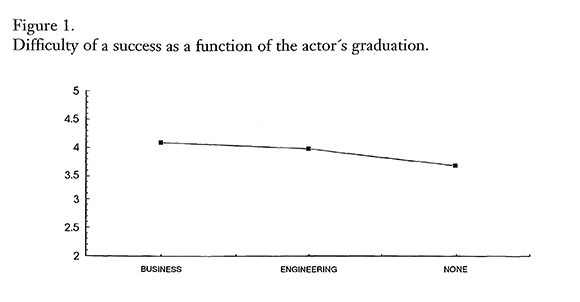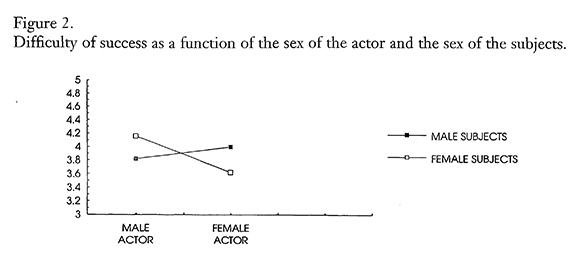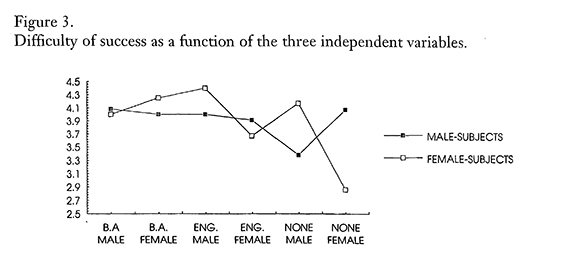Serviços Personalizados
Journal
Artigo
Indicadores
Links relacionados
Compartilhar
Psicologia
versão impressa ISSN 0874-2049
Psicologia vol.11 no.1 Lisboa jan. 1996
https://doi.org/10.17575/rpsicol.v11i1.587
Effects of the social interaction context on social judgeability
António Caetano*; Jorge Vala**
*-**ISCTE, Lisboa
ABSTRACT
The social judgeability model States that in order to give a social judgment, people need to feel that they are in a position to judge. To give a social judgment is not only a question of integrating individual and categorical information about the target. It also depends upon the relationship between the judges and their judgments. Within the pragmatic context surrounding any social judgment, perceivers have to consider its social validity following their theories about that relation. Some factors, may increase this sense of social validity.
According to the social judgeability model, having status may induce people to assume the have sufficient information to make a social judgment. An experiment was conducted to test this hypothesis, manipulating the position status of the judges: higher, equal or lower than the alvo. Two groups of students have participated in this study (first group N=63, secong group N=60). Results show that subjects with higher position status reported greater confidence in their judgments relatively to other subjects. These results are discussed within the framework of impression formation and social judgeability.
RESUMO
O modelo da julgabilidade social afirma que para que um julgamento possa ser realizado, as pessoas necessitam de sentir que estão em posição de julgar. Emitir um julgamento, não é apenas uma questão de integrar informção individual e categorial acerca de um alvo. Depende igualmente da relação que existe entre os juízes e os seus julgamentos. A partir do contexto pragmático que envolve qualquer julgamento social, os percipientes têm de considerar a validade social desse julgamento, basendo-se nas teorias de que dispõem sobre essa relação. Alguns factores podem promover este sentimento de validade social.
De acordo com o modelo de julgabilidade social, um elevado estatuto social pode induzir as pessoas a pensarem que dispõem de informação suficiente para a emissão de um julgamento. Um estudo testando esta hipótese foi conduzido, manipulando o estatuto social dos juízes: mais elevado, igual ou menos elevado do que o alvo. Dois grupos de estudantes participaram neste estudo (primeiro grupo N=63, segundo grupo N=60). Os resultados indicaram que os sujeitos de estatuto mais elevado sentiram-se mais confiantes no seu julgamento do que os outros. Estes resultados são discutidos no âmbito da formação de impressões e da julgabilidade social.
Studies on impression formation and person perception have focused mainly on the different steps of the information processing concerning the subject or subjects being evaluated. These same studies have shown that the information processing about people is regulated by cognitive and motivational factors resulting in a better or worse articulation between the perceiver’s theory and the data concerning the evaluated object (e.g., Brewer 1988; Fiske & Neuberg, 1990). However, the vast majority of these studies does not consider the social context that regulates the relation between the judges, the judgment and the target.
Recently, the social judgeability model proposed by Leyens and coleagues (1992) suggests an analysis of the process of stereotyping and person perception on a broadest form that integrates the social context where judging occurs.
This new model displaces the person’s perception processes from the articulation between data and theory and it’s epistemical value, to the field of the social functionality and social validity of these same processes. In our personal point of view, this model constitutes an attempt to reintroduce in the study of impression formation and stereotypes the attribution of meaning perspective as recently defined by Bruner (1990).
The model of social judgeability focus it’s attention not on the problem of the judgment’s accuracy, nor in the strategies of searching and of processing information but in the relation between judges and their judgments (Schadron et Yzerbyt, 1992). In that vein, the model assumes that when judging people, the first problem the perceivers must resolve is deciding if the person to be judged is effectively judgeable, that is, if, from a pragmatic point of view, attending the interaction context in which they are involved, they feel social legitimacy to judge the target. So a basic assumption of this model is that people judge only when they feel they are in position to do so, that is when they feel their judgments as socially valid.
So, according to the social judgeability model, the person perception processes seem to be mediated by a social norm that we can call norm of individuating information reliability. Now the question is to know how do people cope with that norm.
From our point of view, the interaction context under which a judgment will be emitted can by itself induce the perceivers to the belief that they are obeying to that norm, that is, they are in possession of relevant information, therefore contributing to the increase of the feeling of target judgeability.
Accordingly, the experimental studies that will be described analyse the influence of the social interaction context on the social judgments. More precisely, we will attempt to define the way by which the perceivefis social position in respect to the target may contribute to increase the judgeability of the latest.
The studies presented here consider that one of the heuristics that may be used by individuals to determine the social judgeability of a certain person is based on the analysis of his status in respect to the evaluated target person.
1st Study
Hypothesis.
Independently of the content of the judgment, the confidence of judges over their judgment is higher when their status is higher than the status of the evaluated subject.
123 students from two different universities volunteered for this study.
Independent Variable.
According to the presumed results of a previous questionnaire, in the «high status» condition subjects were lead to believe that they would be the leaders of a team which included the person being evaluated; in the «equal status» condition subjects were informed that they were going to be included in a team as colleagues of the person being evaluated; finally, in the «low status» condition subjects believed they were going to be working in a team lead by the evaluated person.
Dependent Variable.
The confidence on the judgment emitted by the evaluators about the target person.
The confidence degree was measured through a 11 position scale (-5 «no confidence at all», +5 «absolute confidence»).
Procedure.
After the manipulation the subjects read an application form, supposedly filled out by the target person, which contained the following «information»: Name (João M.), Address (unknown Street in Lisbon), Age (21), Nationality (Portuguese) and application date.
Provided with such information subjects were than asked to answer a questionnaire about the day-to-day life of the target person and to indicate the degree of confidence on their’s answers.
Finally, they were requested to answer a control question in which they were asked what were there’s and the target person’s role in the team.
Two replicas of the same experimental design took place with subjects of the two different universities.
Results.
The analysis of the checking question of the manipulation showed that all the subjects identified correctly their and the target’s role.
Since two replicas took place, the data were analysed in the same ANOVA
The results show (Fig. 1, p. 30) that there is no effect from the replicas and that there is a main effect of the status position of the perceiver (F(2.122)=7.1, pc.001). The confidence degree of the judging is greater when the perceiver is in a position of higher status than the target person. However, there are no differences when the status position is either lower or equal to that of the target.
Discussion.
The findings of this experiment support the hypothesis that the judgeability of the target person is influenced by the interaction social context in which a judgment take place. That is, the sattus position of the judge. Keeping in mind that subjects had no individual information about the person being judged, these results show that the person that is in an higher social position feels that is in position to judge the target. However, the fact that no differences were found between the equal and the lower status suggests that more than the relative status position of the author towards the target, the contextual determinant factor of the raising social judgeability is the absolute status position. The increase of the subjective value of the judgment seems, therefore, to be strongly connected to a high position in the social structure.

In order to control the ecological validity of the conclusions suggested by the data of this first study a field study was conducted.
2nd Study
Hypothesis
People with a high status feel in better position to express social judgments attributing more confidence to their judgments than those without such a status, no matter what the relative position of the judge is towards the target.
Experimental design
To test this hypothesis a design with two factors and with repeated measures in the target position was conducted.
Being a field study it should be noted that in this experiment the subjecfis status correspond to natural positions occupied by them in the company where the study was conducted.
Method.
Subjects
23 subjects working in the same company participated in the study.
Independent variables.
The organisational position of the perceiver corresponds to the natural role that the subjects occupy in the company, expressed in two categories: managers and non-managers.
The status of the target person has two levels: that of the perceiver or higher than that of the perceiver.
Dependent variable.
Participants in this study were first asked to answer a questionnaire about the performance of the target subject. After answering the questionnaire, the dependent variable was introduced.
Results.
According to our hypothesis, a main effect of organisational position of the evaluator was obtained (F(l ,21) = 9.77, p<.005), standing for a higher confidence of the judgment of a powerful judge independently of the status of the evaluated person.

3 rd Study
This third study analysis the impact of the social climate and of the status of the target on the social judgeability by recalling the results and hypothesis of K. Lewin (Lewin et al., 1939) about the effects of the social climate on personal interaction. We can consider that one of the main characteristics that differentiate an authoritative climate from a participative climate is the fact that the latest implies a perceptioned sharing of power, along with closer relationships and open communication.
In this way, we can assume that in an authoritarian climate, in which the power distance is higher, the individual will feel powerless on their own aptitude to judge, whereas in a participative climate, given the share of power and the open communication that characterises it, even individuals who do not hold formal power will believe a bigger aptitude to judge. The social judgeability of a target person then will increase in a participative climate.
We can therefore formulate the following hypothesis:
Hypothesis.
In a participative climate, more than in an authoritative one, subjects without formal power show more confidence in their judgments about a target person. When these targets have the same status as the judges.
We can formulate the same hypothesis when the targets have higher status than the judges.
When the targets have a lower status than the judges, however, we would expect more confidence in the authoritative climate than in the participative one.
Unfortunately, we were not able to test later hypothesis, because of the constrains of the field. Indeed, our subjects were basic workers who did not have inferiors.
Method.
Subjects
3 0 non-managers from two different companies participated in this study.
Independent Variables.
The independent variable «social climate» was measured through an adaptation of the questionnaire created by Likert (1964) to analyse the organisational climate. This questionnaire allows the placement of organisational climates on a continuum between authoritative (1) and participative (8). In the first company, subjects evaluated the management climate as being participative (M=6,5) whereas in the second one the climate was evaluated as authoritarian (M=1,8).
The variable «status of the evaluated» with two levels (equal or superior to the judge) was also considered.
Dependent Variable.
Like in the preceding studies, the dependent variable is the confidence degree of the subjects on their judgment about the target.

Main effect of the organisational context (F(1,28)= 9.44, p<.005)
Interaction effect of the organisational context and the target status (F(1,28)= 10.54, p<.003)
Results.
Results were analysed by an Anova 2 (social climate: authoritative vs. participative) X 2 (status of the evaluated target: equal/superior), with repeated measures in the second factor.
A main effect of the social climate variable was obtained standing for a higher judgeability of the target in the participative social climate.
An interaction effect qualifies the main effect. The targetis judgeability is significantly higher in the participative climate than in the authoritative climate, when the status is higher. The diference is not significant when the status is equal.
Discussion.
The results obtained in this study seem to support the following hypothesis: the norms of social interaction, namely the social climate, that regulate the context in which a judgment is expressed may themselves increase or decrease the social judjeability of the targets. Nevertheless, it should be underlined that the differences which caracterized organizational climates have an impact on the totality of work relations.
In fact, in participative climates there’s not only more share of power, but also more open communication. So one may speculate that the results obtained are explained by the climate of interpersonal relationships, which lead people to believe they are in possession of individuated information.
However, the interction effect suggests that probably the perceived sharing of power also accounts for these results. In fact, the intensity of social interaction is usually greater with peers than with superiors which shonld lead to a higher judgeability of the former. Instead, results show that social judgeability is higher when managers are being judged. Nevertheless, this is an open question requiring new studies that isolate the effects of the several dimensions of the social normative context where the judgments are expressed.
General Discussion
Taken as a whole, these results support the perspective on the study of person perception and on the study of stereotypes open by the social judgeability model.
The first studies in the framework of the social judgeability model had shown the role of the norm of individuating information reliability on person perception, underlying that the belief on possessing individuating information about someone, even when lacking it, can lead the perceiver to assume that is in condition to judge a certain target.
The studies presented now, however, show that other factors are involved in the relation of the evaluator with his judgment contributing to increasing the judgeability of the target.
In fact, the first two studies clearly show the effect, in person perception, of a social norm that one may label as the power furs reliability norm. That is, the results suggest that a powerful evaluator feels he holds sufficient information to evaluate the target just because he has power.
The third study raises a new field of problems. It was shown that in a participative climate individuals that do not share formal power consider they are in possession of the necessary information to judge more than the individuals in an authoritative climate do. Nevertheless, this study was a correlational one, did not acounting the effect of the low status position of the target person. So, the results call for more studies on the effects of the socio-normative determinants of the interaction on the social judgment.
Referências
Bruner, J. S. (1990). Acts of meaning. Cambridge, Mass: Harvard University Press.
Brewer, M. B. (1988). A dual process model of impression formation. In T. K. Srull e R. S. Wyer, Advances in social cognition, vol. 1, 1-36. Hillsdale, NJ: LEA.
Fiske, S.T., e Neuberg, S. L. (1990). A continuum of impression formation from categorybased to individuating processes: influences of information and motivation on attention and interpretation. In M. P. Zanna (Ed.) Advances in experimental social psychology, 23. N. York: Academic Press. [ Links ]
Leyens, J. Ph., Yzerbyt, V, e Schadron, G. (1992). The social judgeability approach to stereotypes. European Review of Social Psychology, vol. 3: 91-120. [ Links ]
Schadron, G. e Yzerbyt, V. (1992). Eimpact des informations au-delà de leur contenu: application de Papproche de la jugeabilité sociale aux stéreotypes. Louvain-la-Neuve: Manuscrito não publicado. [ Links ]
Lewin, K., Lippitt, R. & White, R. (1939). Patterns of agressive behavior in experimentally created social climates. Journal of Social Psychology, 10, 271-299. [ Links ]














